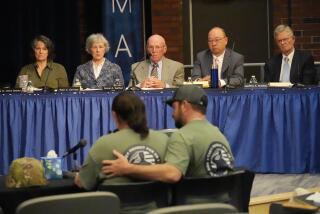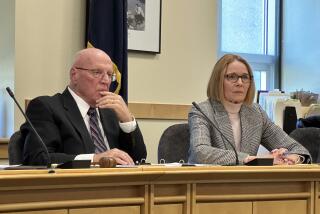S. Africa Violence Panel Takes Aim at De Klerk : Massacre probe: The independent commission says the government ignores its recommendations, impairs its credibility.
- Share via
JOHANNESBURG, South Africa — An independent commission appointed by President Frederik W. de Klerk to investigate violence in South Africa charged Monday that its credibility is being severely damaged because De Klerk has ignored most of its urgent recommendations.
The accusation suggested the difficulty of the task facing Judge Richard Goldstone’s commission, the lone independent body probing the Boipatong massacre. The attack prompted the African National Congress to break off constitutional talks with the government.
De Klerk has tried to deflect ANC allegations of government involvement in the massacre, saying they will be heard and assessed by the independent Goldstone Commission. But the commission’s credibility in the townships has been dealt a blow by the government’s refusal to heed--or even acknowledge--commission recommendations.
However, Goldstone on Monday also criticized the ANC and others for accusing the government of being behind the violence.
The judge noted that, after one full day of hearings on the Boipatong massacre, he has not yet heard any evidence to suggest any “direct complicity in or planning of” current violence by De Klerk or his government security officers.
And the judge urged the ANC and the media to stop making such allegations, which he described as “unwise, unfair and dangerous.”
“They are likely to exacerbate the climate of violence and frustrate attempts to curb violence,” he said.
The ANC, which has demanded a full international inquiry into the violence, criticized the South African judge for “exonerating the security forces . . . even before the commission has sat to hear evidence.” The ANC added that the commission’s investigation of government culpability should extend to acts of omission as well as commission.
Goldstone acknowledged that the Boipatong massacre “cries out for a full and exhaustive inquiry,” and he said full hearings on the matter will begin Aug. 4, with a respected jurist from India joining the panel.
The commission says it will try to determine who was responsible for planning and carrying out the massacre, what action was taken by army units in the township at the time and what preventive measures should have been taken by the police. It will also study the police investigation into the massacre.
In its preliminary day of hearings on the massacre, the commission was told that army units were in the township during the nighttime attack. An army major testified that two units stopped traffic for a band of 80 to 300 armed black men, apparently the perpetrators of the massacre, so they could cross a busy road and leave the township.
No effort was made to arrest the men, an army officer testified, because the soldiers were outnumbered, and the band disappeared into a field.
Goldstone’s biggest concern is that the government has ignored many of his commission’s recommendations, which undermines confidence in the panel’s effectiveness and makes witnesses less willing to testify.
“The commission by no means expects that (its) recommendations should necessarily be accepted or implemented,” Goldstone said. “It does expect, however, that they will not be ignored.”
If the police had heeded one of the commission’s recommendations, for example, the Boipatong massacre might never have happened.
Three weeks before the massacre, which was staged from a migrant worker hostel near the township, the commission had recommended that all hostels be fenced off and that a 24-hour police guard be posted to ensure that weapons were not taken into or out of the hostels. No action was taken, however.
Goldstone also noted that the commission’s recommendation that an army battalion of foreign black soldiers be disbanded was ignored and instead met “with what can generously be described as an unhelpful response from a senior member of the South African Defense Force.”
Similarly, a recommendation last December that a policeman be charged in an unsuccessful conspiracy to murder an ANC leader has been ignored.
The police also have ignored the commission’s January suggestions for improved policing in the Mooi River region, scene of heavy fighting between supporters of the ANC and its rival, the Inkatha Freedom Party.
The commission already faces one major hurdle in its investigations into the Boipatong massacre: Many witnesses won’t testify at a public hearing because they fear retribution.
“People are terrified out of their wits,” said Denis Kunys, a lawyer representing the ANC in the hearings.
Goldstone said that if security forces were involved in the attacks, “it could not be expected of the victims to cooperate with the police” in the investigation.
“The government and the security forces should understand and appreciate the anger and frustration of so many South Africans,” Goldstone added.
More to Read
Sign up for Essential California
The most important California stories and recommendations in your inbox every morning.
You may occasionally receive promotional content from the Los Angeles Times.














